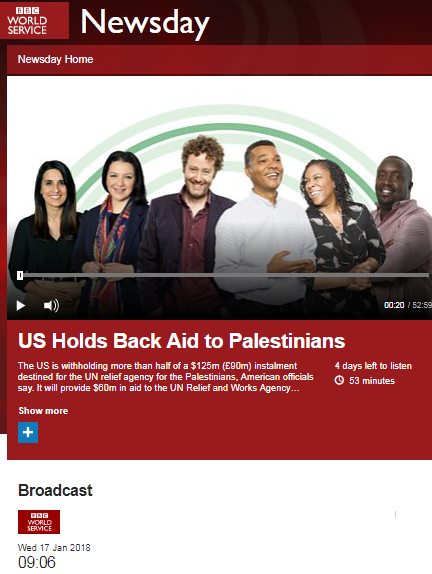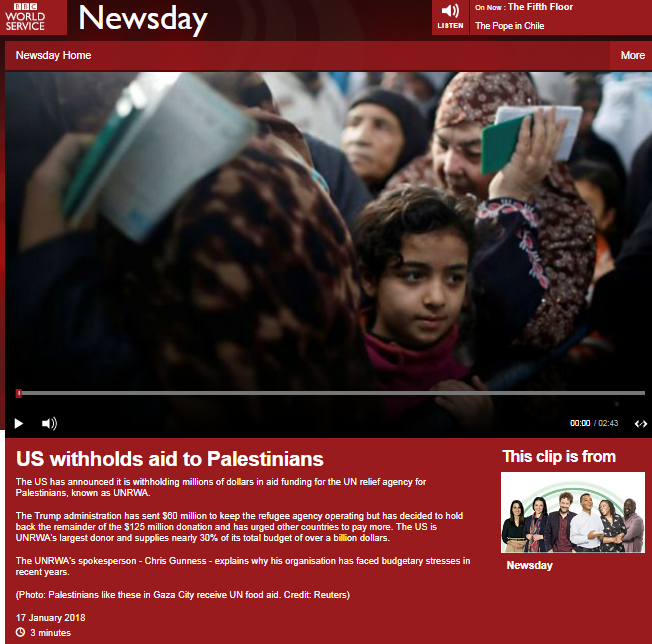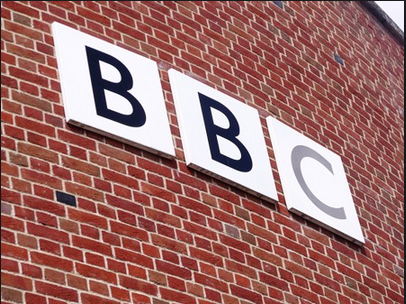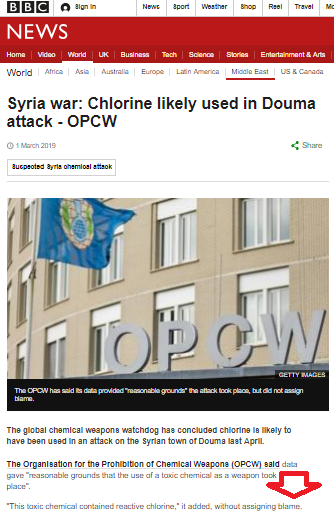As we saw in part one of this post, listeners to the early edition of the BBC World Service radio programme ‘Newsday‘ on January 17th heard two very similar opinions on the story of US aid donations to UNRWA from NGO head Jan Egeland and from the UN agency’s spokesperson Chris Gunness.
In a later edition of the same programme, Gunness was interviewed again (from 02:09 here) by presenter Shaimaa Khalil.
Gunness began by telling listeners that: [emphasis in italics in the original, emphasis in bold added]
Gunness: “The reason why UNRWA’s budget runs out when it does is because the number of refugees we serve goes up and up and up because without a political resolution of their plight, their children remain refugees and that is the case with UNHCR refugees and other refugee populations around the world.”
While Gunness has been promoting that claim for years, it bears closer examination because, as pointed out by Steven J Rosen:
“Unlike its sister agency, the United Nations High Commissioner for Refugees (UNHCR), which is responsible for millions of non-Palestinian refugees worldwide, it [UNRWA] does not have an active program for “local integration” of refugees where they now reside nor “resettlement” in third countries.”
Rosen notes that:
“In 1950, its first director told the General Assembly that the “agency has decided that a refugee is a needy person, who, as a result of the war in Palestine, has lost his home and his means of livelihood.” His definition made no reference to descendants.
Not until 1965, fifteen years after its creation, did an UNRWA commissioner-general decide, against objections from the United States government, to create “an extension of eligibility, subject to need, to the third generation of refugees (that is, to children of persons who were themselves born after 14 May 1948).” […]
In 1982, or thirty-two years after its creation, UNRWA took another step forward by extending eligibility to all generations of descendants. It did so by obtaining a General Assembly resolution instructing UNRWA “to issue identification cards to all Palestine refugees and their descendants” without any limitation on how many generations of descendancy this practice would continue. […]
UNRWA went still further in 1992 by adding a provision that those descendants of Palestine refugee males who “are eligible to register for UNRWA services” and are registered with UNRWA, should be “referred to as Registered Refugees or as Registered Palestine Refugees” though they do not meet UNRWA’s own standard of having lived in Palestine prior to May 1948.”
Regarding Gunness’ claim “that is the case with UNHCR refugees”, Rosen notes:
“UNHCR confers derivative refugee status on the basis of family unity where there is a relationship of dependency. “As a matter of general practice, UNHCR does not promote the reunification of … grandchildren… unless they can be determined to be eligible under the principle of dependency.” This can mean financial dependency, “but also taking emotional dependency into consideration.” […]
It is true that, UNHCR’s basic standard is the nuclear family and that subsequent generations are given derivative refugee status only on an exceptional basis while UNRWA automatically grants grandchildren and great-grandchildren refugee status. But UNRWA defenders such as Gunness can argue that the two agencies are guided by the same basic principles.”
Unchallenged by Khalil on that important point, Gunness (who in his previous interview claimed to “maintain the highest standards of neutrality”) continued:
Gunness: “And the refugees we serve are not only just going up in number but the vulnerabilities they face are also intensifying. In Syria there’s this cruel war raging into its 7th year. In Gaza we see a blockade – a collective punishment in violation of international law – and in the West Bank we’ve seen 50 years of Israeli occupation.”
That Gunness failed to offer any legal basis for his allegations concerning the blockage and refrained from mentioning the terrorism that made it necessary is not surprising. As former UNRWA senior official James Lindsay has noted:
“In 2008, UNRWA issued comparably fewer calls for engaging Hamas. Instead, it has focused on criticizing the Israeli blockade of Gaza […]. In this regard, the agency echoes the Hamas view of the conflict with Israel. For example, when UNRWA ran out of fuel supplies in late April–early May 2008, it implied that its shortage was caused by the Israelis (who were blocking deliveries to Hamas but not to UNRWA) rather than by Hamas’s actions (which included allowing demonstrators to prevent delivery of fuel to UNRWA as well as intimidation of the Petrol Station Owners Association, which subsequently refused to distribute fuel delivered to Gaza by Israel). This propensity to echo Hamas views extends to other issues as well.”
Gunness continued:
Gunness: “What we need to resolve UNRWA’s budget problems is a political settlement. We need a just and durable solution for 5.3 million Palestine refugees who to this day, 70 years after their original exile and dispossession, have remained exiled. They remain stateless and in many cases they are deeply vulnerable. That is what causes UNRWA’s budget problems. UNRWA is an expression of the political failure of the political echelons to bring dignity and resolution to a community that for far too long has been deprived of those things.”
As also noted by Lindsay, UNRWA’s idea of a “political settlement” echoes Palestinian claims of ‘right of return’:
“Regarding the resolution of the Palestinian refugee problem, UNRWA’s sympathies are not with resettlement or “repatriation” to a Palestinian state in the West Bank and Gaza, but with “repatriation” to Israel.”
Shaimaa Khalil made no effort to question Gunness on the issue of the estimated 2 million people defined as Palestinian refugees who hold Jordanian citizenship before going on to ask:
Khalil: “But what do you say to the point being made that the United States has the right to know where the money is going and the point that UNRWA has poorly planned the resources?”
Gunness’ answer to that question repeated claims he made in the first interview of American ‘praise’ for UNRWA during a visit by its commissioner-general to Washington last November. Khalil went on:
Khalil: “Just on the point that your budget is over a billion dollars – this is just $125 million [sic] that’s being withheld. Don’t you think that other countries could step in and provide that amount?”
After Gunness answered that UNRWA is “going after other donors”, Khalil asked him “how will this shortfall affect your operations?” to which (despite having claimed in the previous interview that “what is at stake [is] nothing less than the security and stability of the Middle East”) he replied:
Gunness: “Well let us be clear. The commissioner-general said in his statement that we intend to robustly defend our mandate and we are determined that services will not be impacted. And that remains our position. It is premature to talk about cuts. We will do everything I can…we can a) to go after additional funds and b) to protect the mandate and make sure that the dignity of these people living in such fragile and vulnerable circumstances can continue to be protected with the services that we deliver.”
As we see, not only was Gunness not asked any in-depth questions about UNRWA’s record and agenda that would help BBC audiences understand this story better but his inaccurate and misleading claim concerning hereditary refugee status and his politically motivated allegations concerning Israeli counter-terrorism measures were not challenged at all.
Moreover, not only was the same interview rebroadcast in a later edition of the same programme (from 00:35 here) but the BBC World Service also chose to promote a slightly edited version of it on social media.
Related Articles:
BBC WS Newsday coverage of UNRWA aid story – part one
BBC News report on UNRWA funding story omits relevant background
BBC World Service amplifies UNRWA’s political campaigning yet again
Lyse Doucet’s blatant political propaganda on BBC WS WHYS – part two
BBC WS ‘Newshour’ provides a platform for UNRWA’s political campaigning




